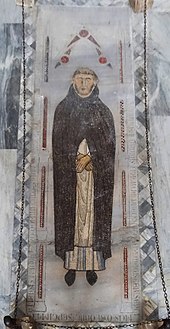Munio of Zamora
Munio von Zamora (* 1237 in Zamora , † February 1300 in Rome ) was a Spanish Dominican , the seventh master of the order and bishop of Palencia . He is considered to be the "founding father" of the Dominican Terces and is credited with writing the Rule for the Brothers and Sisters of the Penance of St. Dominic, which lasted more than 600 years.
Life
Munio entered the Dominican Order in 1257 . Provincial of his home province since 1281 , he was elected master of the order by the general chapter in Bologna in 1285 , although, unlike his predecessors, he had not completed a university degree. In his first circular he demanded that the brothers and sisters of the order strictly observe the rules of the order, especially poverty and silence. After political intrigues and pressure from the papal side, Munio resigned from the office of master of the order in 1291 and was then elected Bishop of Palencia . After hostility he withdrew to the monastery of Santa Sabina in Rome, where he is buried.
The Third Order (Terziaren)
In the rule for the fellowship of brothers and sisters of the penance of St. Dominic, ascribed to Munio, two previously different spiritual forms of life, the Vita activa and the Vita contemplativa, were to be brought closer together. This rule was approved by Pope Innocent VII . Munio's initiative was "the most powerful act of his tenure". From this movement the third order of the Dominicans (Terziaren) emerged in the 15th century , who today call themselves Dominican lay people . These promise obedience to the superior general and are thus accepted into the Dominican order.
literature
- Klaus Bornewasser: Dominicans “in the world”. In: Thomas Eggensperger, Ulrich Engel (ed.): Women and men in the Dominican order. History - Spirituality - Current Projects (Topos Pocket Books, Volume 223). Matthias Grünewald Verlag, Mainz 1992, ISBN 3-7867-1660-9
- William A. Hinnebusch: Short history of the Dominican order (= Dominican sources and testimonies, volume 4). Benno-Verlag, Leipzig 2004, ISBN 3-7462-1688-5
- K.-B. Springer, sermon in the world. About the history of the Dominican laypeople ; in: kontakt , a gift from the Dominicans of the Province of Teutonia 2014, 17–20
Individual evidence
- ↑ Cf. Klaus Bornewasser: Dominicans “in the world”. In: Thomas Eggensperger, Ulrich Engel (ed.): Women and men in the Dominican order. History - Spirituality - Current Projects (= Topos Pocket Books, Volume 223). Matthias Grünewald Verlag, Mainz 1992, ISBN 3-7867-1660-9 , 194
- ↑ William A. Hinnebusch: A Short History of the Dominican Order (= Dominican sources and Testimonies, vol 4). Benno-Verlag, Leipzig 2004, ISBN 3-7462-1688-5 , 70; K.-B. Springer, sermon in the world. About the history of the Dominican laypeople; in contact. Gift of the Dominicans of the Province of Teutonia 2014, 17–20, 19
| predecessor | Office | successor |
|---|---|---|
| Giovanni da Vercelli |
Master of the Dominican Order 1285–1291 |
Stephan of Besançon |
| personal data | |
|---|---|
| SURNAME | Munio of Zamora |
| ALTERNATIVE NAMES | Munio de Zamora |
| BRIEF DESCRIPTION | Spanish Dominican, seventh master of the order and Bishop of Palencia |
| DATE OF BIRTH | 1237 |
| PLACE OF BIRTH | Zamora |
| DATE OF DEATH | February 1300 |
| Place of death | Rome |
